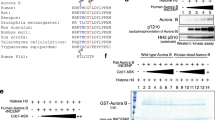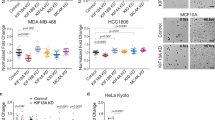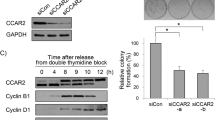Abstract
AuroraA, a mitotic kinase, is reported to be amplified and overexpressed in a variety of human tumors. Active mutants of AuroraA can transform mouse fibroblasts and form tumors in nude mice. However, the mechanism behind this oncogenic potential remains elusive. In this study, we investigated the consequences of AuroraA overexpression and showed that increased AuroraA levels compromise the mitotic spindle checkpoint triggered by nocodazole, a microtubule polymerization inhibitor. This is accomplished by disrupting the proper assembly of the mitotic checkpoint complex at the level of the Cdc20-BubR1 interaction. As a result, the spindle checkpoint complex fails to form and cells progress through mitosis without proper arrest in response to nocodazole. This ability to override the mitotic spindle checkpoint was found to be independent of AuroraA kinase activity. We conclude that maintenance of a functional balance between AuroraA and mitotic checkpoint proteins is essential for the proper progression through mitosis. This study therefore offers a possible explanation of how deregulation of AuroraA can contribute to genetic instability and tumorigenesis.
This is a preview of subscription content, access via your institution
Access options
Subscribe to this journal
Receive 50 print issues and online access
$259.00 per year
only $5.18 per issue
Buy this article
- Purchase on Springer Link
- Instant access to full article PDF
Prices may be subject to local taxes which are calculated during checkout






Similar content being viewed by others
References
Adams RR, Carmena M and Earnshaw WC . (2001). Trends Cell Biol., 11, 49–54.
Anand S, Penrhyn-Lowe S and Venkitaraman AR . (2003). Cancer Cell, V3, 51–62.
Bernard M, Sanseau P, Henry C, Couturier A and Prigent C . (1998). Genomics, 53, 406–409.
Bischoff JR, Anderson L, Zhu Y, Mossie K, Ng L, Souza B, Schryver B, Flanagan P, Clairvoyant F, Ginther C, Chan CS, Novotny M, Slamon DJ and Plowman GD . (1998). EMBO J., 17, 3052–3065.
Chan CS and Botstein D . (1993). Genetics, 135, 677–691.
Chan GK, Jablonski SA, Sudakin V, Hittle JC and Yen TJ . (1999). J. Cell Biol., 146, 941–954.
Chan GK, Schaar BT and Yen TJ . (1998). J. Cell Biol., 143, 49–63.
De Bondt HL, Rosenblatt J, Jancarik J, Jones HD, Morgan DO and Kim SH . (1993). Nature, 363, 595–602.
Fang G . (2002). Mol. Biol. Cell, 13, 755–766.
Farruggio DC, Townsley FM and Ruderman JV . (1999). Proc. Natl. Acad. Sci. USA, 96, 7306–7311.
Giet R and Prigent C . (2000). Exp. Cell Res., 258, 145–151.
Glover DM, Leibowitz MH, McLean DA and Parry H . (1995). Cell, 81, 95–105.
Hardwick KG . (1998). Trends Genet., 14 (1), 1–4.
Hernando E, Orlow I, Liberal V, Nohales G, Benezra R and Cordon-Cardo C . (2001). Int. J. Cancer, 95, 223–227.
Hixon ML and Gualberto A . (2000). Front. Biosci., 5, D50–D57.
Imai Y, Shiratori Y, Kato N, Inoue T and Omata M . (1999). Jpn. J. Cancer Res., 90, 837–840.
Jeffrey PD, Russo AA, Polyak K, Gibbs E, Hurwitz J, Massague J and Pavletich NP . (1995). Nature, 376, 313–320.
Kallio MJ, McCleland ML, Stukenberg PT and Gorbsky GJ . (2002). Curr. Biol., 12, 900–905.
Khan SH and Wahl GM . (1998). Cancer Res., 58, 396–401.
Kufer TA, Sillje HH, Korner R, Gruss OJ, Meraldi P and Nigg EA . (2002). J. Cell Biol., 158, 617–623.
Lengauer C, Kinzler KW and Vogelstein B . (1998). Nature, 396, 643–649.
Li W, Lan Z, Wu H, Wu S, Meadows J, Chen J, Zhu V and Dai W . (1999). Cell Growth Differ., 10, 769–775.
Littlepage LE and Ruderman JV . (2002). Genes Dev., 16, 2274–2285.
Marumoto T, Hirota T, Morisaki T, Kunitoku N, Zhang D, Ichikawa Y, Sasayama T, Kuninaka S, Mimori T, Tamaki N, Kimura M, Okano Y and Saya H . (2002). Genes Cells, 7, 1173–1182.
Meraldi P, Honda R and Nigg EA . (2002). EMBO J., 21, 483–492.
Murata-Hori M, Tatsuka M and Wang YL . (2002). Mol. Biol. Cell, 13, 1099–1108.
Nigg EA . (2001). Nat. Rev. Mol. Cell Biol., 2, 21–32.
Ouyang B, Knauf JA, Ain K, Nacev B and Fagin JA . (2002). Clin. Endocrinol (Oxf)., 56, 341–350.
Reis RM, Nakamura M, Masuoka J, Watanabe T, Colella S, Yonekawa Y, Kleihues P and Ohgaki H . (2001). Acta Neuropathol. (Berl)., 101, 297–304.
Sakakura C, Hagiwara A, Yasuoka R, Fujita Y, Nakanishi M, Masuda K, Shimomura K, Nakamura Y, Inazawa J, Abe T and Yamagishi H . (2001). Br. J. Cancer, 84, 824–831.
Sato M, Sekido Y, Horio Y, Takahashi M, Saito H, Minna JD, Shimokata K and Hasegawa Y . (2000). Jpn. J. Cancer Res., 91, 504–509.
Sen S, Zhou H and White RA . (1997). Oncogene, 14, 2195–2200.
Sen S, Zhou H, Zhang RD, Yoon DS, Vakar-Lopez F, Ito S, Jiang F, Johnston D, Grossman HB, Ruifrok AC, Katz RL, Brinkley W and Czerniak B . (2002). J. Natl. Cancer Inst., 94, 1320–1329.
Sudakin V, Chan GK and Yen TJ . (2001). J. Cell Biol., 154, 925–936.
Takahashi T, Haruki N, Nomoto S, Masuda A, Saji S and Osada H . (1999). Oncogene, 18, 4295–4300.
Tang Z, Bharadwaj R, Li B and Yu H . (2001). Dev. Cell, 1 (2), 227–237.
Terada Y, Tatsuka M, Suzuki F, Yasuda Y, Fujita S and Otsu M . (1998). EMBO J., 17, 667–676.
Walter AO, Seghezzi W, Korver W, Sheung J and Lees E . (2000). Oncogene, 19, 4906–4916.
Zhang Y and Lees E . (2001). Mol. Cell Biol., 21, 5190–5199.
Zhou H, Kuang J, Zhong L, Kuo WL, Gray JW, Sahin A, Brinkley BR and Sen S . (1998). Nat. Genet., 20, 189–193.
Acknowledgements
We thank Wouter Korver for the initial cloning of AuroraA and Shireen Khan for suggestions. We also thank David Parry, Ronald Herbst and Xiaomin Schebye for suggestions and critical review of the manuscript. The DNAX Research Institute is funded by the Schering-Plough Corporation.
Author information
Authors and Affiliations
Corresponding author
Rights and permissions
About this article
Cite this article
Jiang, Y., Zhang, Y., Lees, E. et al. AuroraA overexpression overrides the mitotic spindle checkpoint triggered by nocodazole, a microtubule destabilizer. Oncogene 22, 8293–8301 (2003). https://doi.org/10.1038/sj.onc.1206873
Received:
Revised:
Accepted:
Published:
Issue Date:
DOI: https://doi.org/10.1038/sj.onc.1206873
Keywords
This article is cited by
-
Design, synthesis, and evaluation of 4-chromenone derivatives combined with N-acylhydrazone for aurora kinase A inhibitor
Applied Biological Chemistry (2021)
-
p31comet inactivates the chemically induced Mad2-dependent spindle assembly checkpoint and leads to resistance to anti-mitotic drugs
SpringerPlus (2013)
-
Mitosis as an anti-cancer drug target
Chromosoma (2013)
-
Aurora kinase-C-T191D is constitutively active mutant
BMC Cell Biology (2012)
-
Adenovirus-mediated Aurora A shRNA driven by stathmin promoter suppressed tumor growth and enhanced paclitaxel chemotherapy sensitivity in human breast carcinoma cells
Cancer Gene Therapy (2012)



